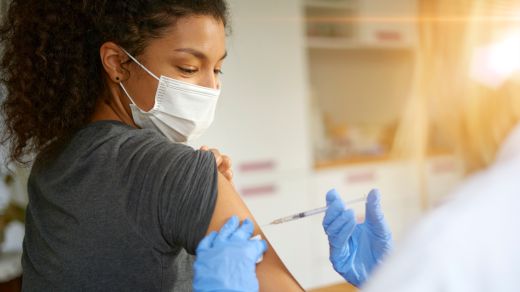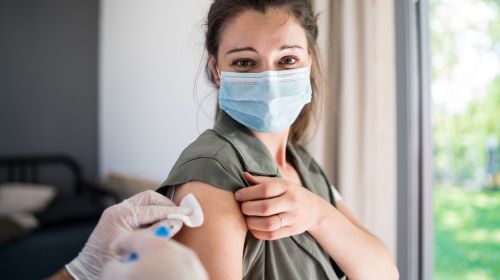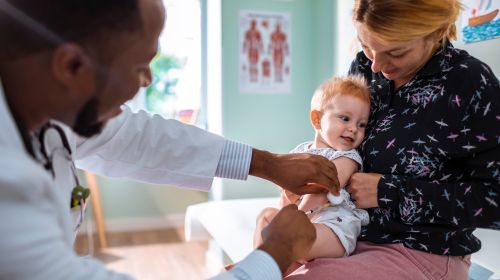Persistent symptoms resulting from a corona vaccination are described as post-vac syndrome. How often the vaccination side effects occur, which symptoms are typical and what treatment options are available.
- © Getty Images/Andriy Onufriyenko
Quick Overview: Post Vac Syndrome
What is Post Vac Syndrome? The very rare post-vac syndrome is persistent symptoms resulting from a corona vaccination.
What are the symptoms of Post Vac Syndrome? Possible symptoms include palpitations, headaches, exhaustion, fluctuations in blood pressure, dizziness and lack of concentration.
How Is Post Vac Syndrome Treated? So far there is no specific therapy that promises a cure. Treatment is symptomatic. Contact points can be specialized centers, for example in the University Hospital Marburg or the Berlin Charité.
At a glance:
What is Post Vac Syndrome?
Fever, chills and pain at the injection site are among the most common side effects of vaccinations. They are due to activation of the immune system responding to the vaccine. Corresponding reactions were very common after vaccination against SARS-CoV-2, but such side effects are also typical after contact with other vaccines.
The post-vac syndrome (also post-vaccination syndrome) is to be differentiated from such harmless and short-term complaints. Rather, it describes persistent symptoms and health restrictions as a result of a corona vaccination. There are great similarities to Long Covid. These complications do not fall under the post-vac syndrome. In addition, Post-Vac should not be confused with long-term side effects or vaccination damage: these are vaccination side effects that only appear years later.
Little research has been done on the post-vac syndrome. There is still no uniform description or classification, which makes diagnosis difficult.
How common is post-vac syndrome
The post-vac syndrome is comparatively rare. By the end of October 2022, only around 1,000 suspected cases had been reported. In relation to the people vaccinated in Germany, this proportion is very low; around 0.001 percent of the vaccinated people suffer from post-vac syndrome. However, Professor Bernhard Schieffer from the University Hospital in Marburg assumes that the numbers will be significantly higher. The expert and head of a Long Covid and Post-Vac specialist outpatient clinic estimates that around 0.02 percent of those vaccinated suffer from persistent symptoms.
In contrast, the risk of contracting Long Covid after a corona infection is significantly higher (between 10 and 20 percent, depending on the variant). It is also assumed that people suffering from post-vac syndrome have a particularly high long-Covid risk and would most likely have become even more seriously ill if they were infected.
Post Vac Syndrome: Symptoms often last for months
The symptoms of post-vac syndrome are not uniform and can vary from person to person. Possible symptoms are:
Possible causes of post-vac syndrome
The post-vac syndrome is currently not well researched, the exact causes and connections are still unclear. Doctors debate various theories, including:
Reactivation of the EBV: Researchers suspect that the Reactivation of a previous Epstein-Barr virus infection could trigger post-vac syndrome.
Incorrect vaccination technique: A study in mice suggests that post-vaccination myocarditis could be due to improper vaccination technique. If the vaccine, including the spike protein, gets into the bloodstream instead of the muscle, it can attack the heart. The main arguments in favor of this thesis are that heart muscle inflammation occurs much more frequently after a COVID infection than after a corona vaccination and that there is significantly more spike protein in the body with a corona infection.
ACE2 receptor: A Marburg research team assumes that a certain enzyme – ACE2 – could be behind the persistent symptoms after a corona infection or vaccination. The molecule is involved in the regulation of blood pressure and serves as a receptor for corona viruses, which get into the cells with the help of ACE2. The assumption is supported by the fact that the largest risk group for Long Covid and Post-Vac Syndrome also have the most of these receptors: young, athletic women are particularly at risk.
autoimmune disease: In the course of the corona infection and the vaccination, the immune system becomes active and forms antibodies. So-called autoantibodies can be found in some people who show the corresponding symptoms: They are directed against the body’s own cells and trigger an inflammatory syndrome.
Diagnosis: Which medical point of contact for post-vac syndrome?
If there is a suspicion of post-vac syndrome, the family doctor’s practice can be consulted first. So far, there are only a few specialized health centers for post-vac patients in Germany. There is an outpatient clinic for post-vac syndrome in Marburg, as well as in the Charité in Berlin. The medical offer is currently to be further expanded. In Bavaria there is a Post-Vac hotline that is supposed to provide information to those affected.
Since the post-vac syndrome is still a largely unexplored phenomenon, it is often difficult to diagnose. It is usually provided by excluding similar clinical pictures. There are no fixed criteria yet.
How Is Post Vac Syndrome Treated?
There is currently no specific treatment for post-vac syndrome. Therapy is often symptomatic. If the heart is affected, appropriate medication is used to stabilize blood pressure and pulse. Painkillers, such as for headaches, are often prescribed.
Some patients are helped by a procedure in which the blood is purified. Blood washing (immunapheresis) is also used in Long Covid. Their effect on post-vac syndrome has not yet been proven in studies, which is why the procedure is not covered by health insurance companies.
Further research is urgently needed to find suitable therapy options for post-vac syndrome.
Is vaccination against Corona still recommended?
Vaccination against the coronavirus protects against serious progression from SARS-CoV-2. While long-term side effects are possible, the benefits far outweigh the risks. Experts continue to come to the conclusion that the corona vaccination is no more dangerous than other vaccinations. Since the corona vaccine was vaccinated on a large number of people in a very short time, the corresponding side effects are more noticeable.


